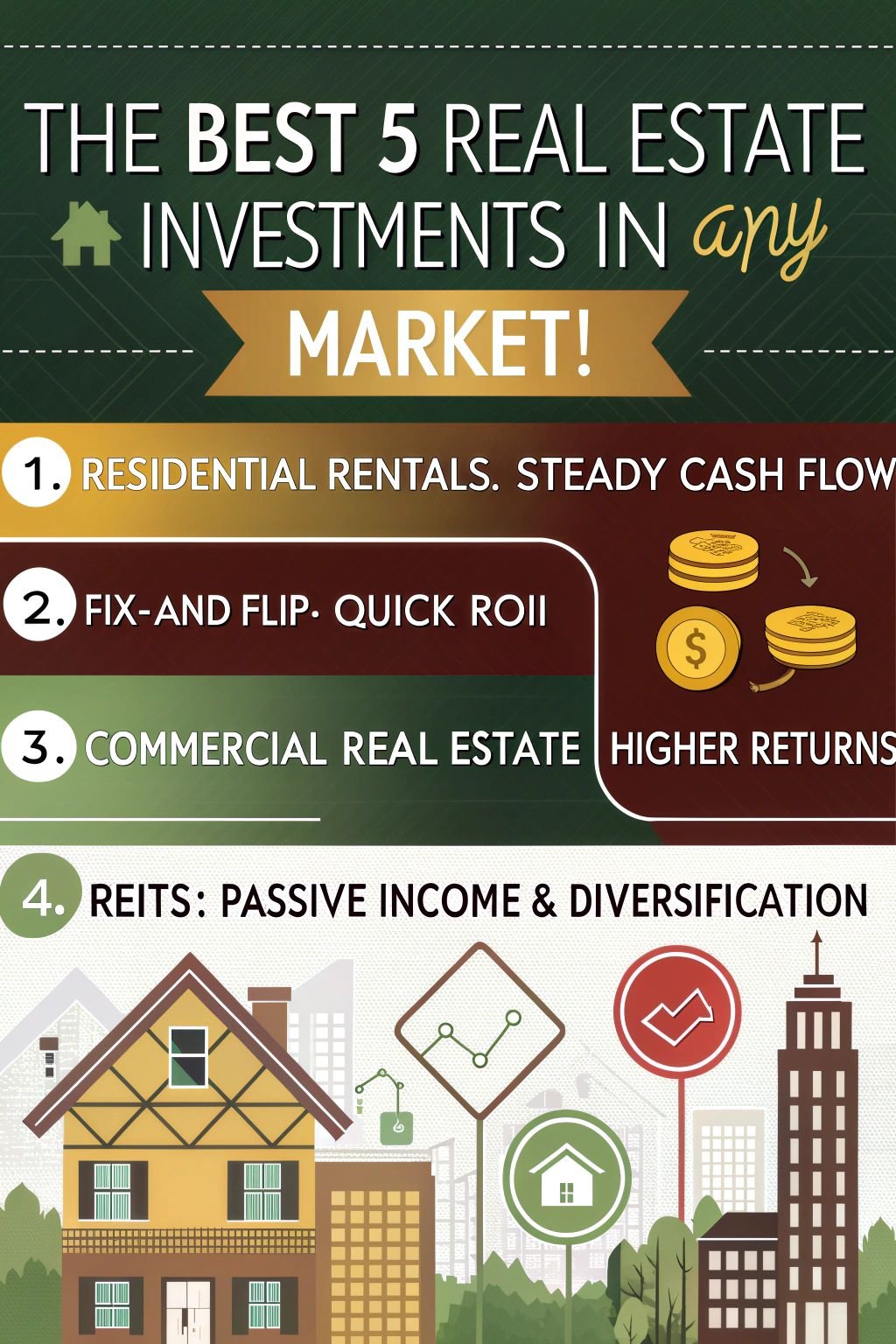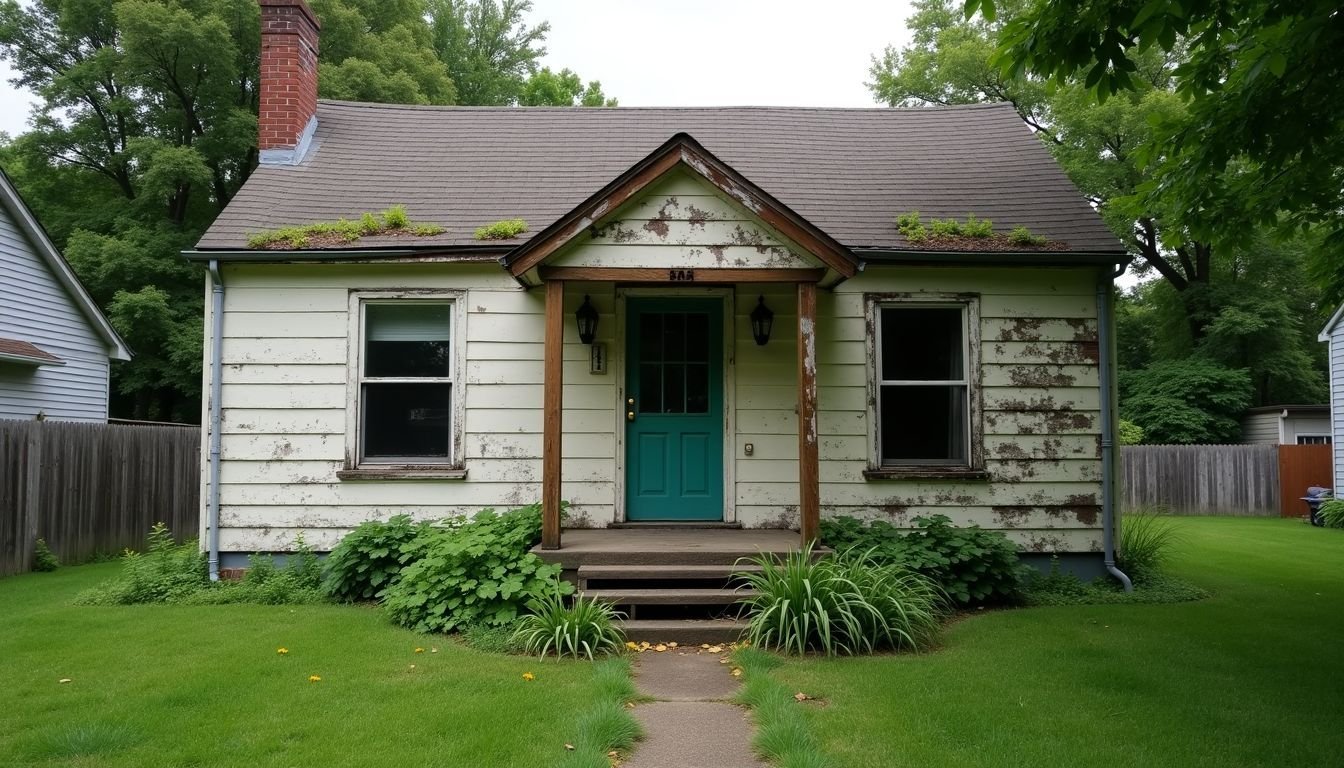Are you looking to invest in real estate but don’t know where to start? With so many options out there, it can be tough to decide which investment is right for you. That’s where “The Best 5 Real Estate Investments” come in. 1
Did you know that real estate has consistently outperformed the stock market over the long term? 3 By investing in real estate, you can diversify your portfolio and potentially earn higher returns than traditional investments.
In this article, we’ll explore the top five real estate investments that can work in any market. Get ready to learn about the benefits and risks of each investment type, so you can make an informed decision.
Let’s get started! 2
Key Takeaways
- Real estate investments like residential rental properties, commercial real estate, REITs, fix-and-flips, and crowdfunding platforms offer attractive opportunities for investors to grow their wealth in any market condition. REITs have historically delivered average annual returns of 11.6% from 1972 to 2021, outperforming the S&P 500’s 10.5% over the same period, according to Nareit data.
- Residential rental properties provide steady cash flow, tax benefits, and long-term appreciation potential. House hacking, where you live in one unit of a multi-family home and rent out the others, can help offset mortgage payments. Fix-and-flip investments can yield quick profits, with an average gross profit of $67,900 per property and a 26.9% return on investment in 2022, but require careful planning and execution.
- Commercial real estate, such as office spaces, retail properties, and industrial buildings, can generate higher returns than residential investments. Prime commercial spaces in high-traffic locations command premium rents and longer lease terms. Real estate crowdfunding platforms like Fundrise and RealtyMogul allow investors to diversify their portfolios with small investments in multiple projects, starting from as little as $500.
- REITs offer accessibility for new investors to earn passive income from real estate without the responsibilities of property management. As of mid-June 2024, 98.6% of REIT stocks are trading below their fair market value, presenting a compelling opportunity for investors seeking high yields and long-term growth.

The Best 5 Real Estate Investments in Any Market

Are you ready to explore the top 5 real estate investments that can thrive in any market? These investment options offer unique benefits and potential for strong returns, regardless of the current market conditions.
From residential rental properties to crowdfunding platforms, each investment type has its own advantages and considerations. Let’s take a closer look at these promising opportunities and how they can fit into your investment strategy.
Residential Rental Properties
Residential rental properties, like single-family homes and apartments, can provide a steady stream of income for savvy investors. When you purchase a rental property, you become a landlord and collect rent from tenants each month.
This consistent cash flow can help cover your mortgage payments, property taxes, and other expenses while building equity in the property as it appreciates over time. Plus, owning rental properties may offer tax breaks, such as deductions for mortgage interest, property taxes, and depreciation. 1
To succeed with rental properties, it’s crucial to do your homework and choose the right location. Look for areas with strong job growth, low vacancy rates, and rising rental prices.
You’ll also want to carefully screen potential tenants and maintain the property to attract reliable renters and minimize turnover. While being a landlord involves some work, the long-term financial rewards can be substantial if you manage your properties effectively and invest in the right markets.
Commercial Real Estate
Commercial real estate includes industrial, office, retail, hospitality, and multifamily properties. These investments often offer higher income potential, longer leases, and lower vacancy rates compared to residential properties. 2 You can invest in commercial real estate directly by purchasing a property or indirectly through REITs or crowdfunding platforms.
Commercial real estate can provide a steady stream of rental income and the potential for capital appreciation over time. – John Smith, Real Estate Investor
When considering commercial real estate, it’s important to conduct thorough market research and due diligence. Factors like location, property condition, tenant quality, and market trends can significantly impact the success of your investment.
Additionally, commercial properties may require more capital and management expertise than residential properties. However, for investors with the resources and knowledge, commercial real estate can be a lucrative addition to their investment portfolio.
Next, let’s explore the benefits of Real Estate Investment Trusts (REITs).
Real Estate Investment Trusts (REITs)
Real estate investment trusts, or REITs, offer you a way to invest in real estate without the hassle of being a landlord. These companies own and operate income-generating properties like hotels, shops, and offices.
REITs must distribute 90% of their taxable income to shareholders each year, providing a steady stream of dividends. As of mid-June 2024, a whopping 98.6% of REIT stocks are trading below their fair market value, making now a great time to consider adding these assets to your portfolio for passive income and diversification. 3
REITs are highly accessible, even for new investors, as you can purchase shares through a brokerage account just like you would with stocks or mutual funds. This low barrier to entry makes REITs an attractive option for those looking to dip their toes into the real estate market without the need for large amounts of capital or extensive knowledge of property management.
With the potential for high yields and long-term growth, REITs can be a valuable addition to your investment strategy, especially in the current market conditions. 4Fix and Flip Properties
Fix and flip properties offer a chance to make quick profits in real estate. You buy a home, renovate it, and sell it for a higher price. In 2022, house flippers made an average gross profit of $67,900 per property with a 26.9% return on investment. 5 But flipping houses takes time and careful planning. Most flips take four to six months from start to finish. 5
To succeed with fix and flips, you need to find the right property at the right price. Look for undervalued homes in good locations that need cosmetic updates. Create a detailed budget and timeline for the renovations.
Use quality materials and hire skilled contractors to ensure the work is done well. Once the improvements are complete, price the home competitively and market it effectively to attract buyers.
With smart decisions and hard work, fix and flips can be a lucrative way to invest in real estate. 6Crowdfunding Platforms
Real estate crowdfunding platforms like Fundrise and RealtyMogul have democratized property investing. They let you invest in a variety of projects, from apartment complexes to office buildings, with as little as $500. 8 You get exposure to the real estate market without the hassles of being a landlord.
These platforms pool money from many investors to fund large-scale developments. They carefully vet each opportunity and handle all the legwork. You can browse listings, review due diligence materials, and track your portfolio’s performance online.
Dividends are paid out quarterly or annually, depending on the platform and investment. 7
Crowdfunding opens up access to high-return assets that were once limited to the wealthy. But there are risks to consider. Your money may be tied up for years in illiquid investments.
And like any real estate venture, returns aren’t guaranteed. Do your homework on the platform, sponsors, and specific deals before diving in. With the right approach, crowdfunding can be a smart way to add real estate to your portfolio.
Residential Rental Properties

Investing in residential rental properties can provide a steady stream of passive income. You can benefit from long-term appreciation as the property value increases over time.
Benefits of owning rental properties
Rental properties offer a reliable source of passive income and long-term wealth building. They provide several key benefits that make them an attractive investment option:
- Cash Flow: Rental properties generate consistent monthly income from tenant rent payments. This cash flow can cover mortgage payments, property taxes, insurance, and maintenance costs, while still providing a profit for the owner. 9
- Appreciation: Real estate tends to appreciate in value over time, especially in growing markets with strong job growth and population influx. As property values increase, so does the owner’s equity and potential profit when selling.
- Tax Benefits: Owning rental properties offers several tax advantages, such as deducting mortgage interest, property taxes, insurance, maintenance expenses, and depreciation. These deductions can significantly reduce the owner’s taxable income.
- Leverage: Investors can use financing to purchase rental properties, allowing them to control a larger asset with a smaller initial investment. This leverage can amplify returns and enable investors to build a real estate portfolio more quickly.
- Inflation Hedge: Rental properties act as a hedge against inflation, as rents and property values typically increase with rising prices. This helps preserve the owner’s purchasing power and provides a stable investment during economic uncertainty.
- Tangible Asset: Unlike stocks or bonds, rental properties are tangible assets that you can see, touch, and improve. This physical aspect provides a sense of control and security for many investors.
- Forced Appreciation: Owners can increase a rental property’s value through renovations, upgrades, and effective property management. These improvements can justify higher rents and boost the property’s overall value.
These benefits make rental properties a compelling investment choice for those seeking long-term financial growth and stability. Commercial real estate offers even greater income potential and diversification for savvy investors.
Long-term income potential
Investing in rental properties can provide you with a steady stream of passive income for years to come. As you pay down your mortgage, your cash flow will increase, allowing you to save more or reinvest in additional properties.
Rental rates tend to rise over time, which means your income will likely grow while your expenses stay relatively stable – giving you a hedge against inflation. 1
House hacking is a smart strategy for maximizing the long-term income potential of rental properties. By living in one unit of a multi-family home and renting out the others, you can have your tenants cover most or all of your mortgage payment.
This approach allows you to build equity in a property while generating rental income to offset your costs – setting you up for a profitable future in real estate investing. 1
Commercial Real Estate

Commercial real estate can be a lucrative investment. You can invest in office buildings, retail spaces, warehouses, or multi-family properties.
Types of commercial properties
Commercial real estate encompasses a wide range of property types. These properties are used for business purposes and can generate significant income for investors. 10
Here are the main types of commercial properties:
- Office Spaces: These are buildings or spaces used by businesses for administrative, professional, or medical purposes. Office spaces are classified into Class A, B, C, and D based on factors like age, location, amenities, and rental rates. Class A offices are the highest quality and command the highest rents, while Class D are the lowest quality and offer the lowest rents. 11
- Retail Properties: These are spaces used for selling goods or services directly to consumers. Examples include shopping malls, strip malls, standalone stores, and boutiques. Retail properties can range from small mom-and-pop shops to large anchor stores in malls.
- Industrial Properties: These are spaces used for manufacturing, production, distribution, or storage. Examples include warehouses, factories, distribution centers, and flex spaces. Industrial properties often have specific features like loading docks, high ceilings, and ample parking.
- Multifamily Properties: These are residential properties with multiple units, such as apartment buildings, condominiums, and townhouses. Multifamily properties can provide a steady stream of rental income and appreciate in value over time.
- Hotels and Hospitality: These are properties that provide short-term lodging or accommodations. Examples include hotels, motels, resorts, and bed and breakfasts. The hospitality industry can be lucrative but is also sensitive to economic fluctuations and seasonal demand.
- Mixed-Use Properties: These are properties that combine multiple uses, such as residential, commercial, and retail, in a single development. Mixed-use properties can create vibrant, walkable communities and offer diversified income streams for investors.
- Special Purpose Properties: These are properties designed for a specific use or industry. Examples include self-storage facilities, data centers, car washes, and churches. Special purpose properties can offer unique investment opportunities but may also have limited resale potential.
- Land: This includes undeveloped or raw land that can be used for future development. Land investments can appreciate in value over time and offer flexibility for investors who want to hold or develop the property later.
High return possibilities
Commercial real estate can offer higher potential returns compared to residential properties. Office buildings in bustling downtown areas and shopping centers in high-traffic locations are especially attractive to investors seeking robust profits. 12 These prime commercial spaces command premium rents from businesses willing to pay top dollar for visibility and foot traffic. With longer lease terms and larger square footage, commercial properties can generate substantial ongoing income streams.
Of course, investing in commercial real estate requires more capital upfront than buying a single-family home. But for those with the means, the payoff can be well worth it. According to recent data from the National Association of Realtors, commercial properties have historically yielded average annual returns of 10-12%, outpacing the typical 6-8% for residential investments.
So if you’re looking to supercharge your real estate portfolio, commercial properties are definitely worth considering. Next up, let’s explore the benefits of Real Estate Investment Trusts (REITs).
Real Estate Investment Trusts (REITs)

Real estate investment trusts (REITs) offer a way to invest in real estate without buying property directly. REITs are companies that own and operate income-generating real estate, such as apartment buildings, shopping malls, and office buildings.
Advantages of REITs for passive income
Real Estate Investment Trusts (REITs) offer a compelling way to earn passive income from the real estate market without the hassles of being a landlord. When you invest in a REIT, you’re buying shares in a company that owns and operates income-generating real estate assets like apartment complexes, shopping malls, office buildings, and warehouses.
REITs are required by law to distribute at least 90% of their taxable income to shareholders in the form of dividends. 4 This means you can sit back and collect regular payouts while the REIT’s professional management team handles all the day-to-day operations and property maintenance.
Another advantage of REITs is their strong track record of delivering competitive returns. Over the long haul, REITs have outperformed traditional stock market indices like the S&P 500.
According to historical data from Nareit, the FTSE Nareit All Equity REITs index posted an average annual total return of 11.6% from 1972 through 2021, compared to 10.5% for the S&P 500 over the same period. 13 REITs also tend to have low correlations with other asset classes, which can help diversify your investment portfolio and reduce overall volatility. Plus, many REITs are publicly traded on major stock exchanges, so you can buy and sell shares just like you would with any other stock, making them a highly liquid and accessible option for individual investors.
Accessibility for new investors
REITs provide an accessible entry point for new investors to get into real estate. You don’t need a huge sum of money to start. With as little as $500-$1000, you can begin investing in REITs through online brokerages or robo-advisors like Betterment or Wealthfront.
This low barrier makes it simple to dip your toes in the real estate market. 13
What’s more, REITs offer instant diversification across different properties and locations. Instead of buying a single rental home, your REIT investment is spread out. This reduces risk compared to going all-in on one property.
Plus, you earn passive income from the rent payments without being a landlord. The REIT handles the day-to-day while still passing along a share of the profits to you. 4
Fix and Flip Properties

Fix and flip properties offer quick profit opportunities for savvy investors. But before diving in, consider these key factors for success in the fix and flip game.
Quick profit opportunities
Fix and flip properties offer you a chance to make fast money in real estate. You can buy undervalued homes, renovate them quickly, and sell for a nice profit. 14 The key is to manage the project efficiently and know your local housing market well.
To succeed with fix and flips, have a solid plan and timeline. Line up reliable contractors and stick to your budget. Choose properties in desirable neighborhoods that will appeal to buyers. 15 Stage the renovated home attractively and price it right for a speedy sale. With some smart moves, you can turn a rundown house into an impressive return on investment.
Key considerations for success
To maximize your profits with fix and flip properties, you need to keep a few critical factors in mind. Here are some
- Location: Choose properties in desirable neighborhoods with good schools, low crime rates, and easy access to amenities like shopping, dining, and entertainment. These areas tend to have higher resale values and attract more buyers. 5
- Property condition: Look for properties that need cosmetic updates rather than major structural repairs. Cosmetic renovations like fresh paint, new flooring, and updated kitchens and bathrooms can add significant value without breaking the bank.
- Budget: Create a detailed budget that accounts for all expenses, including purchase price, renovation costs, holding costs, and selling costs. Stick to your budget to ensure profitability. 16
- Timeline: Time is money in the fix and flip game. Set a realistic timeline for renovations and aim to complete the project as quickly as possible to minimize holding costs and maximize profits.
- Contractor selection: Work with experienced, reliable contractors who can complete the work on time and within budget. Get multiple bids and check references before hiring.
- Staging: Once renovations are complete, stage the property to appeal to potential buyers. Hire a professional stager or do it yourself to showcase the home’s best features and create an inviting atmosphere.
- Pricing: Price the property competitively based on market conditions and comparable sales in the area. Work with a real estate agent who specializes in fix and flips to determine the optimal listing price.
By keeping these key considerations in mind, you can increase your chances of success with fix and flip investments and maximize your profits in any market.
Crowdfunding Platforms

Real estate crowdfunding platforms allow you to invest in real estate projects online. You can diversify your portfolio by investing small amounts in multiple properties.
How real estate crowdfunding works
Real estate crowdfunding platforms connect investors with real estate developers online. You can browse investment opportunities, review details about properties, and select projects that align with your goals.
Crowdfunding sites pool your money with contributions from other investors to fund large developments like apartment complexes or office buildings. This allows you to get started with as little as a few hundred bucks, rather than needing huge sums to buy properties solo. 17
Crowdfunding opens doors to potentially lucrative real estate deals that were once reserved for the wealthy. You gain access to pre-vetted investment options and can spread your cash across multiple projects to diversify.
The platforms handle much of the legwork – screening investments, managing properties, and distributing returns. While there are risks, real estate crowdfunding can be a savvy way to invest in real estate without the hassles of being a landlord.
It’s a 21st-century approach to building a real estate portfolio. 17Diversified investment potential
Real estate crowdfunding platforms open up a new world of diversified investment opportunities. By pooling your money with other investors, you can spread your capital across multiple properties and geographic markets.
This reduces your risk compared to putting all your eggs in one basket with a single property investment. Crowdfunding also lets you invest in real estate sectors that may have been out of reach before, like commercial buildings, multifamily apartments, or even real estate development projects.
You get exposure to a wider range of potential returns. 7
Platforms like Fundrise make it easy to build a well-rounded real estate portfolio, even if you’re starting with just a small amount of capital. Their low $10 minimum investment removes traditional barriers to entry.
With a click of a button, you can own a piece of institutional-quality real estate. Crowdfunding empowers everyday investors to access the same caliber of assets as the big players.
You no longer need to be a high net worth individual to enjoy the wealth-building benefits of a diversified real estate portfolio. It’s a game-changer for democratizing real estate investing. 18
Conclusion

Real estate investing offers exciting opportunities to grow your wealth. Whether you prefer hands-on involvement or passive income, there’s an investment strategy that fits your goals.
Residential rentals, commercial properties, REITs, fix-and-flips, and crowdfunding platforms are all viable options in any market. By doing your research and choosing wisely, you can build a profitable real estate portfolio that stands the test of time.
FAQs
1. What are the best real estate investments in 2024?
The top real estate investments in 2024 will vary depending on factors like population growth, job market strength, and home price trends. However, some promising real estate markets to watch include cities with low unemployment rates, growing populations, and rising rental demand. Investors looking for the best places to invest should conduct thorough market analysis.
2. How can I make money in real estate?
There are many ways to make money in real estate – from rental properties to real estate investment trusts (REITs) and online real estate platforms. Investors may choose strategies based on their experience level, capital, and goals. Some popular options include fix-and-flip, wholesaling, and buying rental properties for regular income.
3. What types of real estate investment opportunities are available?
Real estate offers a variety of investment opportunities, such as residential homes, multifamily buildings, commercial properties, and even raw land. Investors can also explore real estate funds, ETFs, and crowdfunding platforms. The key is to understand the ins and outs of each investment type and align them with your financial objectives.
4. Can I invest in real estate with little money?
Yes! While some real estate investments require significant capital, there are ways to get started with smaller amounts. Strategies like house hacking, partnering with other investors, or investing in REITs and real estate crowdfunding platforms can help you enter the market without breaking the bank. Just be sure to do your due diligence and understand the risks involved.
5. How do I choose the best real estate investments for my portfolio?
Selecting the best real estate investments depends on your goals, risk tolerance, and market knowledge. Consider factors like location, property type, potential return on investment, and market trends. Don’t be afraid to start small and diversify your portfolio over time. Seeking guidance from experienced investors or professionals can also help you make informed decisions.
6. What are some emerging trends in the real estate investment landscape?
The future of real estate investing is exciting, with trends like technology integration, sustainable building practices, and a focus on community development. Online real estate platforms and digital tools are making it easier for investors to access opportunities and manage their portfolios. Additionally, there’s growing interest in niche markets like senior housing, co-living spaces, and vacation rentals.
References
- ^ https://rentpost.com/resources/article/best-income-properties-new-investors/ (2024-09-18)
- ^ https://www.commercialpropertyadvisors.com/5-best-commercial-real-estate-types/
- ^ https://money.usnews.com/investing/articles/best-reits-to-buy
- ^ https://www.investopedia.com/articles/mortgages-real-estate/10/real-estate-investment-trust-reit.asp
- ^ https://www.investopedia.com/articles/mortgages-real-estate/08/house-flip.asp
- ^ https://www.limaone.com/the-best-fix-and-flip-markets/
- ^ https://www.nerdwallet.com/best/investing/real-estate-crowdfunding-platforms
- ^ https://money.com/best-real-estate-crowdfunding-sites/ (2023-10-24)
- ^ https://www.rentalincomeadvisors.com/blog/rentals-reign-supreme (2024-05-12)
- ^ https://fnrpusa.com/blog/types-of-commercial-real-estate/ (2021-12-14)
- ^ https://bfpminc.com/5-types-of-commercial-real-estate/
- ^ https://smartasset.com/mortgage/most-profitable-real-estate-investments (2024-08-28)
- ^ https://www.nerdwallet.com/article/investing/reit-investing
- ^ https://www.dawgsinc.com/top-5-real-estate-investments-with-the-most-profit-potential/ (2024-09-13)
- ^ https://www.nasdaq.com/articles/real-estate-investments-most-profit-potential (2024-08-28)
- ^ https://futuramo.com/blog/mastering-the-art-of-fix-and-flip-your-guide-to-profitable-real-estate-investments/
- ^ https://money.usnews.com/investing/articles/best-real-estate-crowdfunding-platforms (2023-11-22)
- ^ https://www.theownteam.com/blog/top-real-estate-crowdfunding-platforms-a-guide-for-new-investors/ (2024-11-11)





















